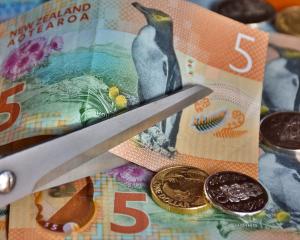
Air New Zealand will cut about $30 million in costs during the next six months to offset higher fuel costs in the current year.
In an internal note to staff, chief executive Christopher Luxon, said the airline was looking at ways of coping with the burden of a high fuel cost environment.
It is understood this includes a freeze on hiring non-customer facing staff, cutting back on some of its marketing activity, reducing use of contractors and limiting the amount of travel staff take for work purposes.
It would not involve cutting spending on customer facing staff, products and services where the airline faces intense competition from other carriers.
In his internal newsletter Luxon said savings ''would come from a mix of turning off programmes of work, resource reductions and tightening up on discretionary spend.''
While fuel prices have retreated from four-year highs it reached in October the damage was done earlier in the year.
Luxon said fuel would make up the largest component of operational costs at $1.3 billion this year, up from $987 million last year and $827 million the year before.
''While some of the rise is attributable to the growth of our network, the majority of this increase is due to the volatility in the price of fuel.''
The International Air Transport Association jet fuel monitor shows global prices in mid-November were 13.4% higher than at the same time a year ago.
Luxon told about 11,000 staff that since 2013, the airline had been working on securing profitable revenue growth and keeping costs under control, to create the profits and cash to reinvest back in the business with new aircraft, market expansion and investments in the customer experience and our own culture.
Given the volatile nature of fuel prices at the moment he has asked the executive to identify further long-term sustainable cost savings before the end of January to kick in from the beginning of the next financial year from July 1 2019.
''Air New Zealand is better positioned than a number of other global airlines, as we hedge our future fuel cost to help reduce some of the volatility that can occur with fuel price changes.''
Hedges would help the airline in the current financial year to some extent, but this was only a short-term solution, he said.
''To position our business for continued strength over the longer term, we must use this time to adjust for a higher fuel price environment. You may have already noticed our business reflecting this change by implementing a series of fare increases and making capacity reductions where necessary.''
Total spending by the airline in the last financial year was $4.193 million, of which labour was the biggest expense - $1.294 million.
Fluctuating fuel prices have contributed to the airline’s share price volatility. Shares have ranged from $3.41 to $2.62 during he last 12 months.
Air New Zealand will also be hit by financial fallout from problems with Rolls-Royce engines on many of its Dreamliners.
Scheduling changes would cost the airline between $30 million and $40 million in the current year.
Other airlines have also cut or trimmed capacity to New Zealand and raised prices as a result of higher fuel costs.












